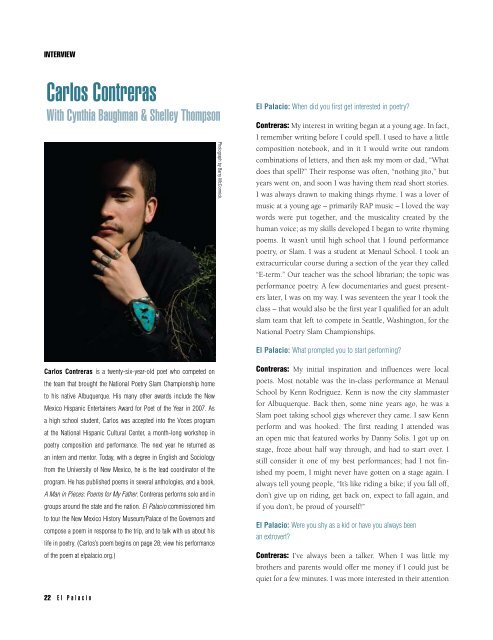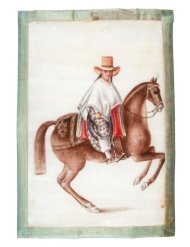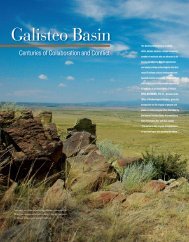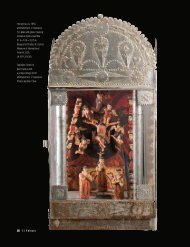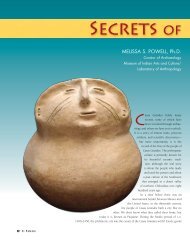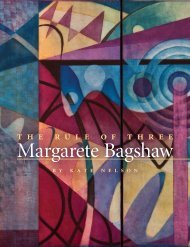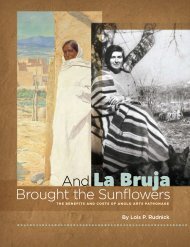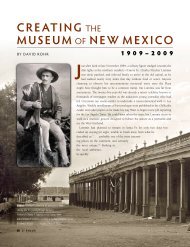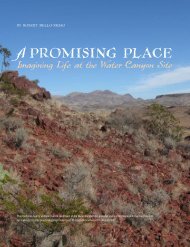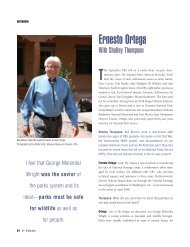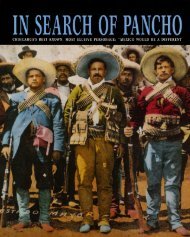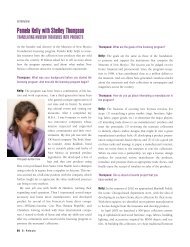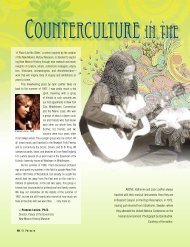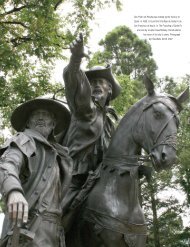Interview with Carlos Contreras - El Palacio Magazine
Interview with Carlos Contreras - El Palacio Magazine
Interview with Carlos Contreras - El Palacio Magazine
You also want an ePaper? Increase the reach of your titles
YUMPU automatically turns print PDFs into web optimized ePapers that Google loves.
INTERVIEW<br />
<strong>Carlos</strong> <strong>Contreras</strong><br />
With Cynthia Baughman & Shelley Thompson<br />
<strong>Carlos</strong> <strong>Contreras</strong> is a twenty-six-year-old poet who competed on<br />
the team that brought the National Poetry Slam Championship home<br />
to his native Albuquerque. His many other awards include the New<br />
Mexico Hispanic Entertainers Award for Poet of the Year in 2007. As<br />
a high school student, <strong>Carlos</strong> was accepted into the Voces program<br />
at the National Hispanic Cultural Center, a month-long workshop in<br />
poetry composition and performance. The next year he returned as<br />
an intern and mentor. Today, <strong>with</strong> a degree in English and Sociology<br />
from the University of New Mexico, he is the lead coordinator of the<br />
program. He has published poems in several anthologies, and a book,<br />
A Man in Pieces: Poems for My Father. <strong>Contreras</strong> performs solo and in<br />
groups around the state and the nation. <strong>El</strong> <strong>Palacio</strong> commissioned him<br />
to tour the New Mexico History Museum/Palace of the Governors and<br />
compose a poem in response to the trip, and to talk <strong>with</strong> us about his<br />
life in poetry. (<strong>Carlos</strong>’s poem begins on page 28; view his performance<br />
of the poem at elpalacio.org.)<br />
22 E l <strong>Palacio</strong><br />
Photograph by Barry McCormick.<br />
<strong>El</strong> <strong>Palacio</strong>: When did you first get interested in poetry?<br />
<strong>Contreras</strong>: My interest in writing began at a young age. In fact,<br />
I remember writing before I could spell. I used to have a little<br />
composition notebook, and in it I would write out random<br />
combinations of letters, and then ask my mom or dad, “What<br />
does that spell?” Their response was often, “nothing jito,” but<br />
years went on, and soon I was having them read short stories.<br />
I was always drawn to making things rhyme. I was a lover of<br />
music at a young age – primarily RAP music – I loved the way<br />
words were put together, and the musicality created by the<br />
human voice; as my skills developed I began to write rhyming<br />
poems. It wasn’t until high school that I found performance<br />
poetry, or Slam. I was a student at Menaul School. I took an<br />
extracurricular course during a section of the year they called<br />
“E-term.” Our teacher was the school librarian; the topic was<br />
performance poetry. A few documentaries and guest presenters<br />
later, I was on my way. I was seventeen the year I took the<br />
class – that would also be the first year I qualified for an adult<br />
slam team that left to compete in Seattle, Washington, for the<br />
National Poetry Slam Championships.<br />
<strong>El</strong> <strong>Palacio</strong>: What prompted you to start performing?<br />
<strong>Contreras</strong>: My initial inspiration and influences were local<br />
poets. Most notable was the in-class performance at Menaul<br />
School by Kenn Rodriguez. Kenn is now the city slammaster<br />
for Albuquerque. Back then, some nine years ago, he was a<br />
Slam poet taking school gigs wherever they came. I saw Kenn<br />
perform and was hooked. The first reading I attended was<br />
an open mic that featured works by Danny Solis. I got up on<br />
stage, froze about half way through, and had to start over. I<br />
still consider it one of my best performances; had I not finished<br />
my poem, I might never have gotten on a stage again. I<br />
always tell young people, “It’s like riding a bike; if you fall off,<br />
don’t give up on riding, get back on, expect to fall again, and<br />
if you don’t, be proud of yourself!”<br />
<strong>El</strong> <strong>Palacio</strong>: Were you shy as a kid or have you always been<br />
an extrovert?<br />
<strong>Contreras</strong>: I’ve always been a talker. When I was little my<br />
brothers and parents would offer me money if I could just be<br />
quiet for a few minutes. I was more interested in their attention
than their cash though; I never won their challenges. I’ve channeled<br />
that energy into trying to encourage others to be social,<br />
outside the box, and comfortable speaking up in the world –<br />
<strong>with</strong>out a voice in this world, people get swallowed up.<br />
<strong>El</strong> <strong>Palacio</strong>: Can you define “Slam poetry” for us?<br />
<strong>Contreras</strong>: Slam is the competitive art of spoken word.<br />
Anyone that reads poetry on a stage can be a Slam poet –<br />
they just have to be willing to have a number applied to<br />
their performance directly after. Slam started in the late 80’s<br />
in Chicago, created by a man named Marc Smith. He was a<br />
construction worker, looking for regular Joes to have a buy-in<br />
when it came to poetry. So he created a competition, since<br />
everyone likes to see people win and lose. Slam is a competition<br />
in which five judges are selected at random, the poet is<br />
given three minutes and nine seconds, and there must be no<br />
props, music, or plagiarism. The rest is up to the performer.<br />
At the end of the piece, judges score it from zero to ten. The<br />
high and low scores are dropped, the middle three are kept as<br />
the poet's score for the round. Most Slams are three rounds,<br />
<strong>with</strong> the lowest scorer(s) from each round sitting down, and<br />
the high scorers moving on.<br />
<strong>El</strong> <strong>Palacio</strong>: Do you think the competition is good for the<br />
creative process?<br />
<strong>Contreras</strong>: Yes! There is always this argument that Slam and<br />
the competition it encourages have a negative effect on writers<br />
and writing, but the fact of the matter is, when “page poets”<br />
submit for publication, they are competing just the same.<br />
They may not see the score cards immediately, but they are<br />
getting a thumbs up or a thumbs down.<br />
<strong>El</strong> <strong>Palacio</strong>: What are the advantages of performance poetry versus<br />
poetry written primarily for print?<br />
<strong>Contreras</strong>: First, allow me to say that I respect poetry in all<br />
forms, page, stage, or otherwise. One advantage of performance<br />
poetry is that there is less room for confusion. When<br />
someone is speaking clearly, directly, and in person, the poetry<br />
is often more easily understood. Performance poetry often<br />
gets the label of “being real.” I'll take that as a compliment<br />
any day.<br />
<strong>El</strong> <strong>Palacio</strong>: Do you think that print publication diminishes your work?<br />
<strong>Contreras</strong>: I love to see my work in print, although sometimes<br />
publication makes it clear to me that I still have many things<br />
to learn when it comes to writing for the page. I would like<br />
to have a book of work published by a major commercial or<br />
independent press one day.<br />
<strong>El</strong> <strong>Palacio</strong>: What other poets, writers, artists, or musicians have<br />
inspired you?<br />
<strong>Contreras</strong>: I’ll go from most relevant and local to more wide<br />
reaching. Poets who inspire me: Hakim Bellamy, Aaron<br />
Cuffee, Jasmine Cuffee, Damien Flores, Kenn Rodriguez, Joe<br />
Romero, Esme Vandrager, Jessica Lopez, James Altamirano,<br />
Levi Romero, and Faustino Villa to just name a few, and guess<br />
what, they all live in Albuquerque! Musicians that inspire me:<br />
Bob Marley, Brother Ali, Talib Kweli, Lauryn Hill, Invincible,<br />
Eminem, Santana, Everlast, La Junta, Diles, Patch, Jungle, and<br />
the list goes on…. Most influential initial inspiration: Slam<br />
poet Saul Williams. Notable Teachers: Dr. Fenni Coleman,<br />
Levi Romero, and Mr. Lucero, my twelfth grade English<br />
teacher.<br />
<strong>El</strong> <strong>Palacio</strong>: Where else do you find inspiration?<br />
<strong>Contreras</strong>: I am a regular working Joe, nine-to-five kind of<br />
guy, and inspiration is everywhere. I write about life experience,<br />
the reality of life, the ugliness of life, and the sometimes<br />
happy moments. I find inspiration in waking up and starting<br />
my truck for work. I look at the world through the lens of a<br />
poet twenty-four hours a day, seven days a week. I might not<br />
write every day but every second I am on this earth is a second<br />
I am soaking up material for possible work to come.<br />
<strong>El</strong> <strong>Palacio</strong>: How do you choose topics?<br />
INTERVIEW<br />
<strong>Contreras</strong>: I often sit down and just see where my fingers on<br />
the keyboard lead me. I rarely sit down and say, “I’m going<br />
to write about……” I usually just sit down and write, then<br />
try and work <strong>with</strong> whatever came out. Sometimes it doesn’t<br />
always work out, but more often than not, it’s something I will<br />
work <strong>with</strong> sooner or later. Often I have between five and a<br />
dozen poems all being worked on at the same time.<br />
<strong>El</strong> <strong>Palacio</strong> 23
Placitas photographer Barry McCormick created this portrait of<br />
<strong>Carlos</strong> <strong>Contreras</strong> by projecting one of his poems onto his face.<br />
<strong>El</strong> <strong>Palacio</strong>: Are all of your poems autobiographical or do<br />
you create characters?<br />
I love to write about the self. I often write pieces that are partially<br />
autobiographical and partially fiction. I love character<br />
sketches and things that make people think about the human<br />
condition. You catch pieces of my life in a lot of my poems,<br />
and fictional information as well. My work tends to be a mix<br />
of the real, and the created – I just let you try and figure out<br />
what is what, on your own.<br />
<strong>El</strong> <strong>Palacio</strong>: How do you decide how personal to be?<br />
<strong>Contreras</strong>: Writing for me is therapy. Sometimes one has to<br />
hurt in order to be able to heal, therefore, I rarely hold back.<br />
I expose whatever it is I want to, and worry about it later. I<br />
draw no lines <strong>with</strong> my work, and will never do so: the reality<br />
of life is what is attractive to many about the work that I do.<br />
And unless I can be real, and vulnerable, I will never get the<br />
populations I work <strong>with</strong> as a teacher to trust me or themselves<br />
enough to open up and be honest <strong>with</strong> themselves and the<br />
rest of the world.<br />
<strong>El</strong> <strong>Palacio</strong>: When did you start teaching?<br />
<strong>Contreras</strong>: I started teaching as a teacher of record on an<br />
Intern License last year. However, <strong>with</strong> teaching being a loose<br />
term, and <strong>with</strong> the work in the community and school around<br />
the state that I have done, I guess you could say I started<br />
teaching nine years ago. I started doing workshops in schools<br />
at the age of seventeen. I actually remember on a couple of<br />
occasions, calling in sick to classes at my own school, to go<br />
do writing workshops at another (I had an awesome mom).<br />
I have been teaching high school classes to primarily adult<br />
incarcerated, and post-incarceration populations since fall of<br />
last year.<br />
<strong>El</strong> <strong>Palacio</strong>: Tell us about your work <strong>with</strong> prisoners.<br />
<strong>Contreras</strong>: My job came about in a funny way. I was bussing<br />
tables at a local restaurant, Flying Star, when I ran into an old<br />
boss of mine, Greta Roskom. Greta and I got to talking about<br />
a new opportunity she’d been given, to run and staff Gordon<br />
Bernell Charter School, which was soon to open. I immediately<br />
went home, emailed her, and asked to be interviewed. The<br />
rest is history. Entering the Metropolitan Detention Center<br />
was like a dream come true. I have always been fascinated<br />
by the results of incarceration and now I was going to get<br />
to work first hand <strong>with</strong> those individuals, in hopes of making<br />
a difference. I was mainly support staff for the first year,<br />
however, I was given the go-ahead to conduct open mics, and<br />
bring in guest poets. Over the past two years, we have had<br />
world-renowned artists in the pods of MDC. I have worked<br />
<strong>with</strong> numerous groups of inmates on writing narrative poems.<br />
I have witnessed many individuals confront the demons that<br />
put them behind bars. I have seen the good, the bad, and the<br />
ugly when it comes to poetry; I have been blessed to be given<br />
a window into a population that many forget about. Sixty-five<br />
percent of those behind bars have children and lack a high<br />
school diploma--if we do not show those adults the importance<br />
of an education, how, upon release, do we expect them<br />
to translate that same important message to their children?<br />
<strong>El</strong> <strong>Palacio</strong>: When <strong>El</strong> <strong>Palacio</strong> attended a performance by your Voces<br />
students, we were struck by the encouragement and support that the<br />
students showed each other. How do you foster that atmosphere?<br />
<strong>Contreras</strong>: The first point I make about Voces, on the first day<br />
of June, at the National Hispanic Cultural Center, is that it is a<br />
safe place. The Voces program should be a place where young<br />
writers come to stretch, grow, and challenge themselves and
each other, so I reinforce that the space we share is a safe and<br />
supportive place, and that everyone needs to foster such an<br />
attitude and working condition. The kids love to be there, so<br />
really, it doesn’t take a lot of work, just a little encouragement<br />
and checking in from time to time.<br />
<strong>El</strong> <strong>Palacio</strong>: We were also struck by the range of material the students<br />
presented--from funny and lighthearted to wrenching personal tragedies.<br />
How do you coach young students on composing and presenting<br />
stories about such terrible situations as having a drug-addicted<br />
parent?<br />
<strong>Contreras</strong>: I seldom coach for content – meaning, rarely do I<br />
tell students exactly what and how to write about something.<br />
Students get multiple ideas from which to begin pieces of<br />
writing, and they decide what to refine, edit, rewrite, or throw<br />
out. We often see writing that never arose from assigned<br />
prompts, but instead, grew from ideas the students came up<br />
<strong>with</strong> on their own. Sometimes these ideas are heavy-hearted<br />
subjects that needed to come out. What I do is prepare writers<br />
to welcome and run <strong>with</strong> any idea, if and when it comes.<br />
<strong>El</strong> <strong>Palacio</strong>: What is your most popular poem, or your favorite to<br />
perform?<br />
<strong>Contreras</strong>: My most popular poem right now would probably<br />
be a poem I call “These People.” It is a character sketch piece.<br />
It introduces five different characters, some of whom are real,<br />
some of whom are fictional (I let the crowd try and figure<br />
that out). It is theatrical in its delivery, and usually is a crowd<br />
pleaser. It is a poem that I can really perform the socks off of,<br />
“go over the top,” so to speak. The poem(s) I like most are<br />
those I’ve written about my father over the years. My father is<br />
a Vietnam Veteran, and former Marine. He suffers from posttraumatic<br />
stress syndrome. I write a lot about his struggles<br />
<strong>with</strong> PTSD, and what it did to us as a family over the years.<br />
I love to perform this kind of work – it is the closest to my<br />
heart, and tells what is most important to me: family.<br />
<strong>El</strong> <strong>Palacio</strong>: Would you rather publish in The New Yorker or have a<br />
YouTube hit?<br />
<strong>Contreras</strong>: I love YouTube, however, I have to say I would<br />
much rather be published in The New Yorker. Being seen on<br />
YouTube doesn’t pay my bills – and don’t get me wrong I am<br />
not all about money, but the easier I can pay my bills, the<br />
sooner I'm touring year-round, sharing my gift <strong>with</strong> countless<br />
individuals, paid or pro-bono. That is what I am working<br />
towards. n


